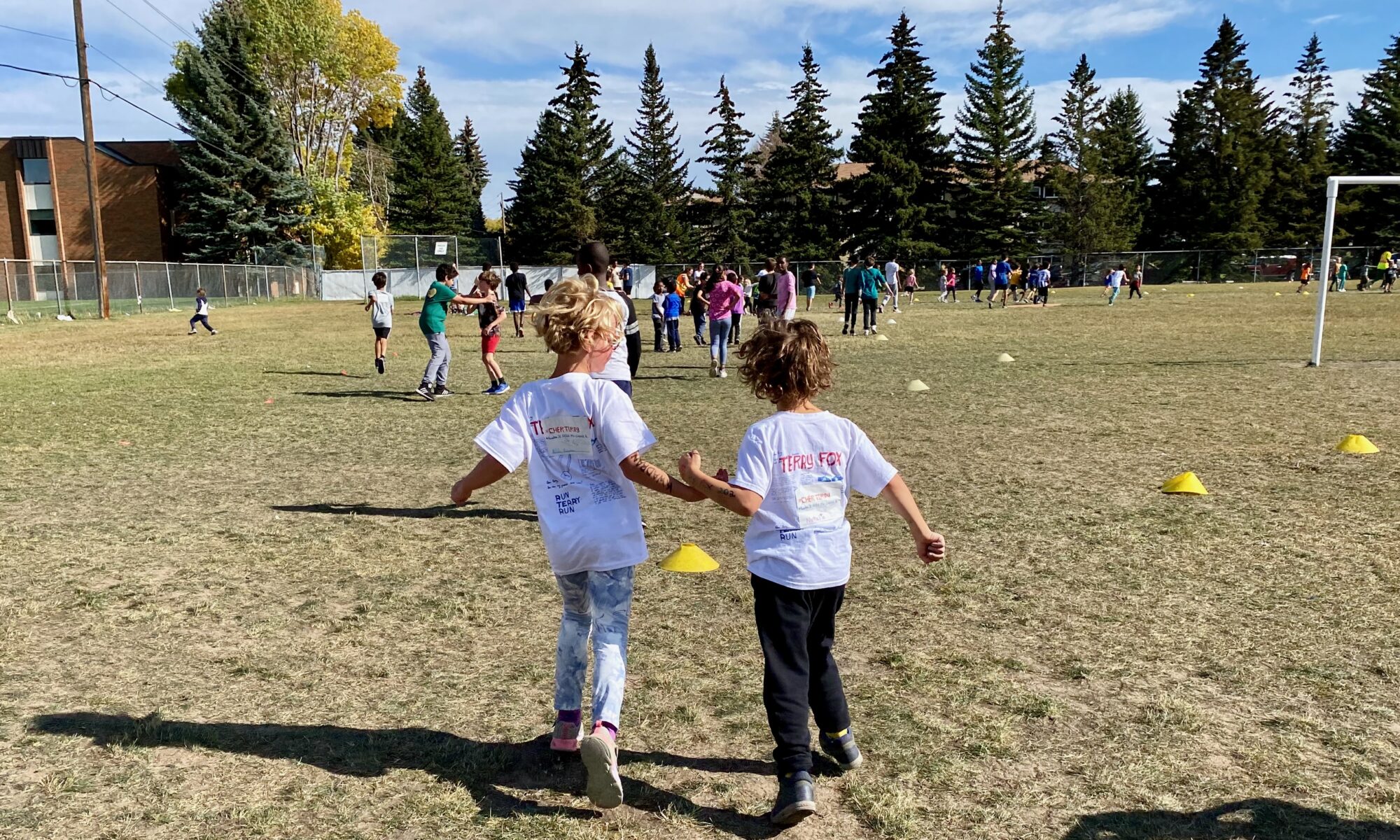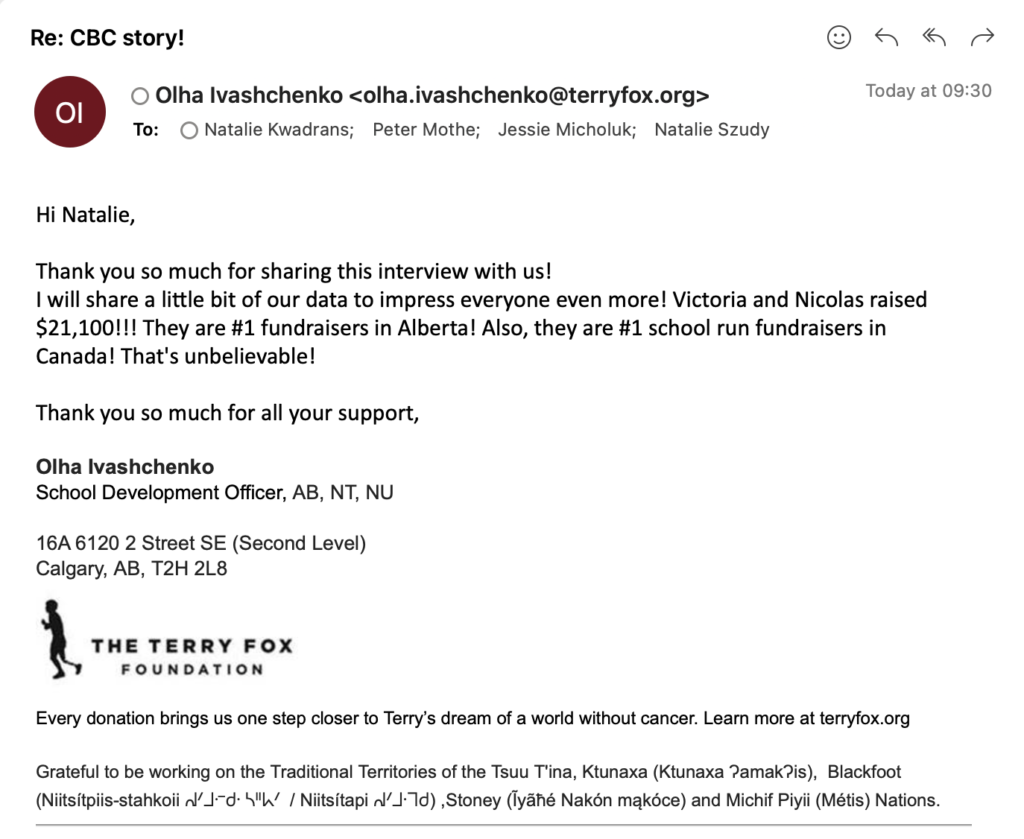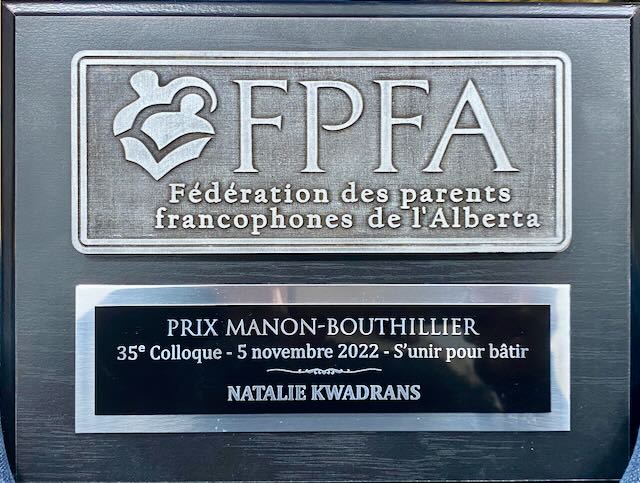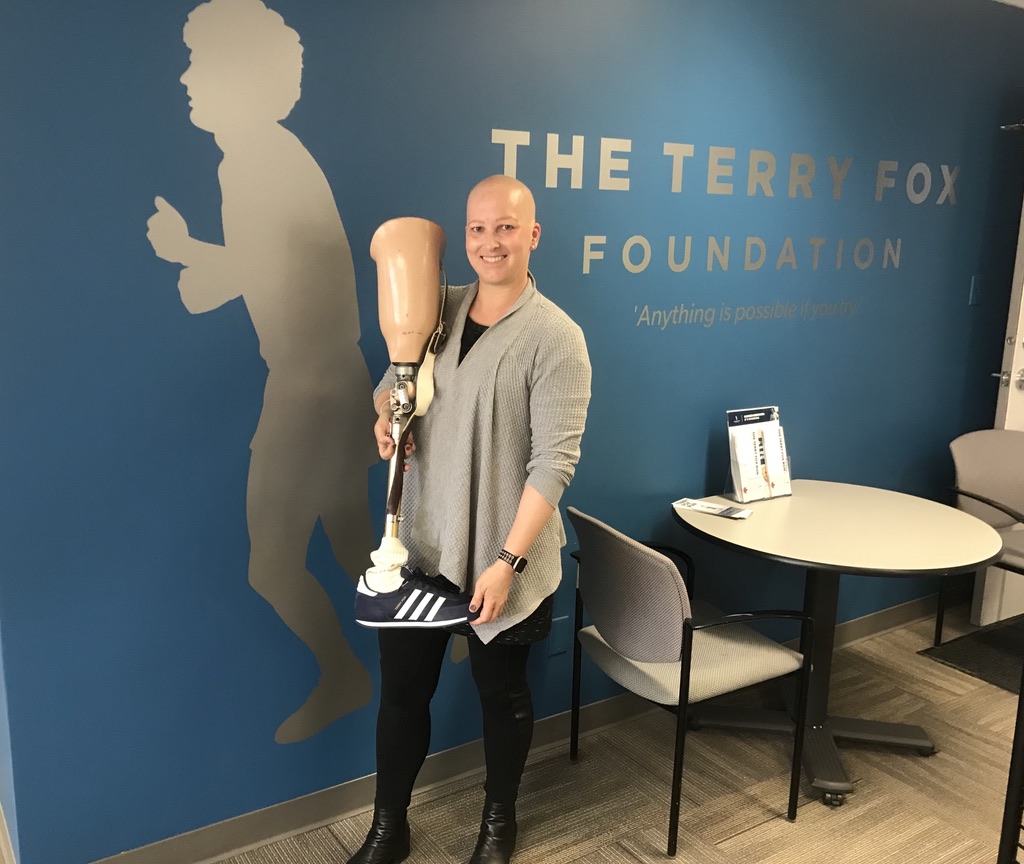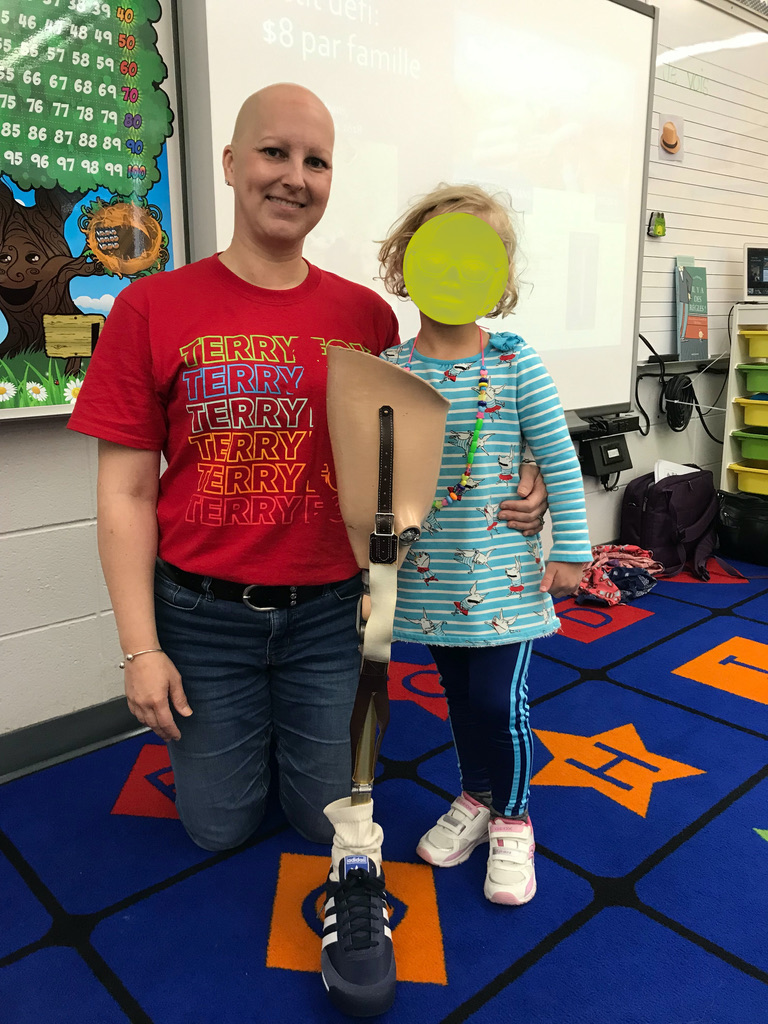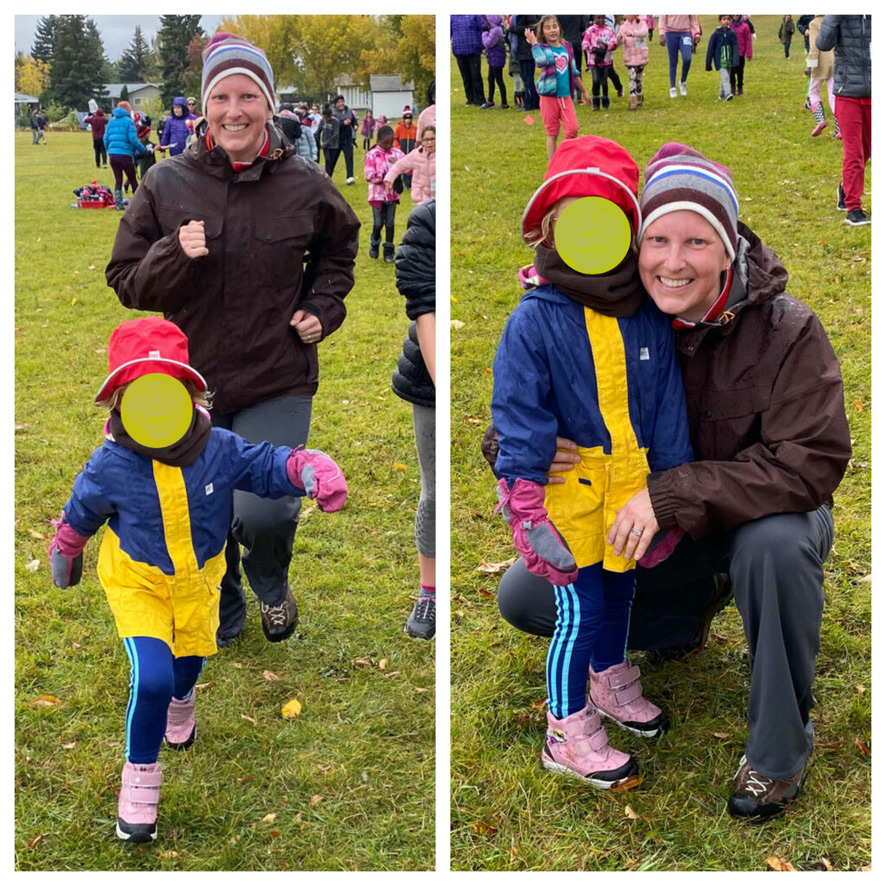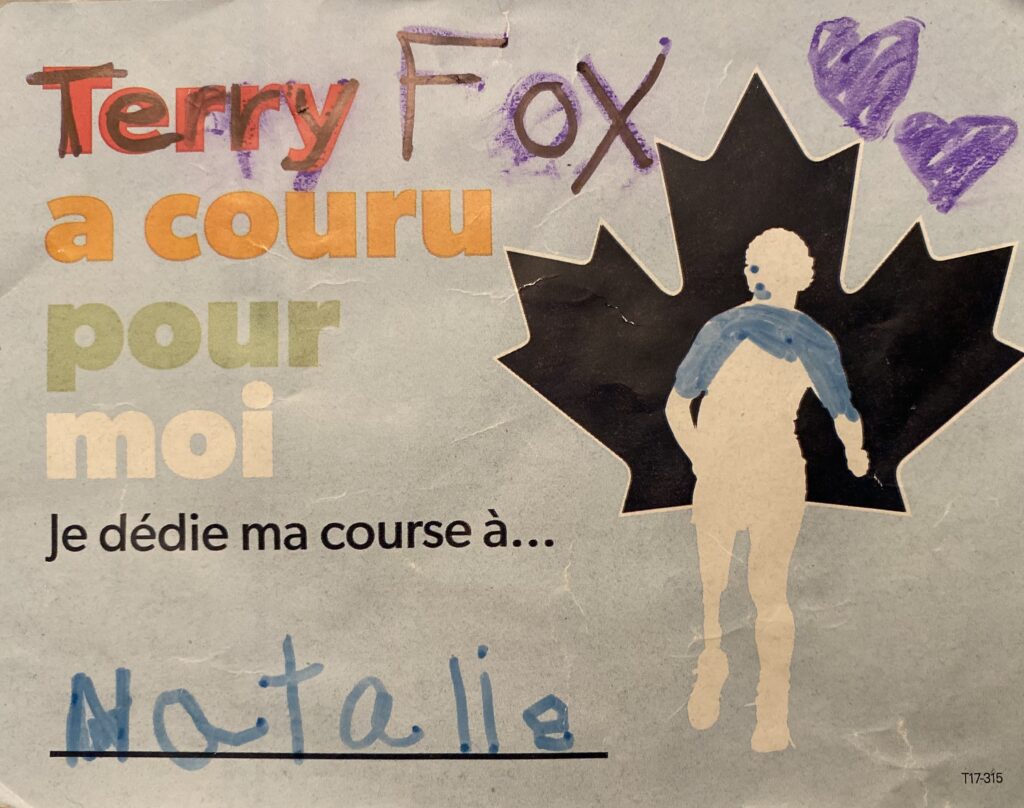What a day May 30th was for cancer care in Canada! I was energized to read the Terry Fox Foundation’s open letter calling on doctors, scientists and philanthropists to increase collaboration within the oncology community for the benefit all cancer patients. Its headline read: “This is the beginning of the end for cancer as we know it.”
It gave me goosebumps!
For context, a week ago, I was in Toronto for the Terry Fox Research Institute’s 10th Annual Scientific Meeting. Everyone I met, from researcher, clinician, board member, patient to philanthropist, felt the same: we are on the cusp of achieving Terry’s dream. I believe this letter will be one that marks an important milestone in Terry’s legacy. I signed it, as a Patient Partner, alongside the most respected oncology researchers and clinicians in North America. The digital version of the letter is available on the Terry Fox Foundations website.
Wow! What an honour!
Shifting gears away from the research and treatment sides of cancer to screening. If you follow my blog, you likely know that since my diagnosis, I have been advocating, along with so many breast cancer experts and patients, to reduce the screening age and to provide supplemental screening to women with dense breasts, such as mine. It was therefore a very emotional day when I read the draft Canadian Breast Cancer Screening Guidelines only to find out the guidelines remained mostly unchanged. Although it wasn’t unexpected – the Canadian Task Force on Preventative Health Care took out an advertorial a few weeks earlier to pre-emptively position the draft guidelines and did so under the guise of a Q&A with the Task Force’s chair. The Hill Times touts itself as having an unmatched readership of Canada’s most important public policy decion-makers in order to communicate with them before decisions are made.
This advertorial, intended to “sell” the draft guidelines prior to their release, soured my lemonade!
And while I expected exactly what was released by the Task Force on May 30, 2024, it was such a letdown. The guidelines remained virtually unchanged from the 2018 ones, which also were virtually unchanged from the 2011 ones. I shared my concerns on X as soon as I had an opportunity to read them, and later in the day, I was asked by CBC Radio in Calgary to comment on them.
What did not make it on air was how emotional I became when thinking about how these guidelines were going to impact the women that come behind me, the next generation such as my daughter. We all found our cancers too late. It felt like I had the wind knocked right out of me. I would die before I’d see the advocacy work myself and so many others have been doing for years, make a difference for these younger women.
These proposed guidelines mean there will be more cases like mine.
More young women will accidentally findtheir cancer on their own or with incidental imaging.More young women will heartheir breast cancer has already spread.More young women will now be subjected to much harsher treatments.More young women will die needlessly early,like five of my friends did.Like the my friend in hospice will.Like I will too.
Natalie Kwadrans – de novo stage 4 cancerdiagnosed in March 2019, 5 days after her 46th birthday
- The new guidelines:
- create even more confusion that what already exists.
- With the Canadian guidelines having remained unchanged for so long, provinces created their own guidelines to reflect updated research.
- Some provinces also created guidelines for women who have factors that increase their overall risk: dense breasts, ethnic or genetic predispositions, etc..
- The Task Force’s proposed guidelines do not align with the 10 provinces that have committed to lowering their screening age.
- create inequity for breast cancer screening across Canada;
- grossly overestimate the “harms” of screening and underestimate the “benefits”;
- place enormous weight on “patient’s values and preferences”, when the data was derived from retrospective analysis.
- The analysis was done on data for which patients had been conditioned, for over a decade, to the idea that women needed to wait until 50 to begin self-examinations or screening.
- Guidelines since 2011 have focused on communicating how the “harms” of screening significantly outweigh the benefits.
- Women had been repeatedly told about how much anxiety they would experience waiting for results or because they received a false-positive, which resulted in a recall.
- Very little emphasis was placed on the reduction of required treatment associated with early detection, improved quality of life and better outcomes. As a result, patients were predisposed to “prefer” or “value” what had been indoctrinated in the over the years leading up to them requiring screening.
- It is very difficult to accept this research at face value and research needs to be done on women’s actual preferences and values when provided with a holistic view of the pros and cons of earlier screening;
- the Task Force’s Chair is the co-lead of family practice for Choosing Wisely Canada, whose focus is to reduce unnecessary tests and treatments in Canada, and who also is a speaker for topics such as overdiagnosis. The Task Force’s Conflict of Interest Policy is very clear as to what consists of non-financial interest (page 5, section 3.2);
- there is no expertise on the Task Force, which results in a significant gap between what was included in the proposed guidelines, global best-practices and what is recommended by experts in their field;
- the lack of industry and patient engagement;
- they set a precendence as to how future guidelines are set by this Task Force . The Task for sets guidelines so for so many other illnesses, from post-partum depression screening, and hypertension, to impaired vision, diabetes and many other cancers.
- create even more confusion that what already exists.
The concerns identified above, if not fixed, will be perpetuated and negatively impact the health of virtually all Canadians. In fact, The Coalition for Responsible Healthcare Guidelines are very concerned with the Task Force’s “dangerous guidance” for cancer screenings.
Shortly after the Task Force released its guidelines, the Federal Minister of Health, Mark Holland, stepped in. During the press release in which he reacted to the proposed guidelines, he stated how “concerned and disappointed” with them. He did not feel the guidelines provided clear directions to health care providers, nor did they conform with what he heard from experts and patients across the country. He has now ordered full review of the process, the data and Task Force composition. A recording of his press conference is available on the CPAC YouTube channel, and his written statement can be found on his X account. These were the changes we had been advocating for!
Minister Holland had just stirred the lemonade and added sugar to it; it tasted so much better now. Although the work is far from done, this is a big milestone for cancer screening. The heaviness that fell upon me was lifted just as quickly. We had been heard! And I cried
May 30, 2024 will forever be etched in my mind as a significant milestone for cancer care in Canada, with increased collaboration across the industry.
If you found my post interesting, feel free to buy me a coffee.


